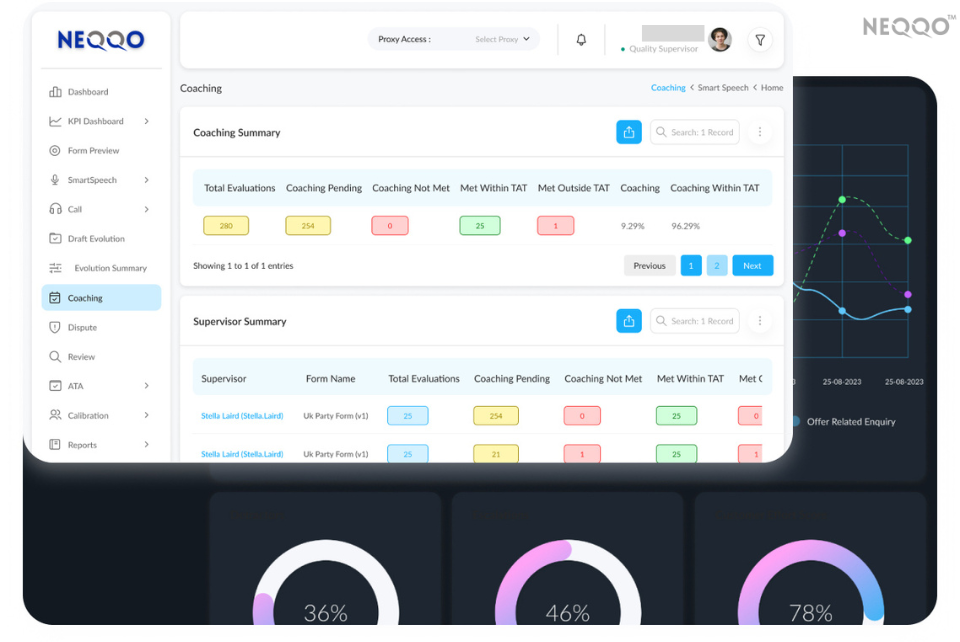Introduction
In the fast-evolving world of customer service, coaching call center agents has transformed from an intuitive process into a science grounded in data. Gone are the days of guessing an agent’s strengths and weaknesses. Today, data-driven coaching, powered by advanced analytics, is revolutionizing agent development, enabling organizations to elevate performance, boost customer satisfaction, and drive business success.
1. Understanding Data-Driven Coaching
1.1. What is data-driven coaching?
Data-driven coaching is a modern agent training and development approach that uses analytics, metrics, and insights to improve performance and effectiveness.
Unlike traditional methods, which relied on general observations and standardized training modules, data-driven coaching enables supervisors to provide tailored and actionable feedback.
1.2. Measuring the Right Key Performance Indicators (KPIs)
Measuring the appropriate KPIs to understand how analytics can enhance agent performance is crucial. These metrics offer insight into both agent effectiveness and customer satisfaction.
Key KPIs to monitor include:
- Call Handling Time (CHT): It measures how efficiently an agent resolves customer issues.
- Customer Satisfaction Score (CSAT): It gauges customers’ satisfaction with their interactions.
- First Call Resolution (FCR): It tracks how often customer issues are resolved on the first contact, a critical driver of customer satisfaction.
- Net Promoter Score (NPS): It indicates how likely customers are to recommend your services.
By analyzing these KPIs, supervisors can pinpoint areas for improvement and provide targeted coaching that directly impacts performance.

Sources:sqmgroup|fullview|convin|kmowmax
1.3. Benefits of data-driven coaching
To truly understand data-driven coaching, it is essential to know about its benefits, which are:
- Personalized Agent Development: Customized coaching based on each agent’s strengths and weaknesses, ensuring focused and practical training.
- Improved Agent Performance: Real-time feedback and analytics help agents refine their skills, enhancing efficiency and productivity.
- Enhanced Customer Satisfaction: Metrics-driven insights enable agents to provide better service, improving customer experience and loyalty.
- Proactive Training Identification: Highlights team-wide skill gaps, allowing organizations to address challenges before they impact performance.
- Reduced Turnover: Personalized support and growth opportunities boost agent engagement, reducing attrition rates.
- Higher ROI: Measurable KPIs improvements justify investing in data-driven coaching tools and strategies.

2. How Analytics Can Elevate Agent Performance
Analytics are the foundation of data-driven coaching, turning raw performance metrics into actionable insights. Here’s how they transform agent performance:
2.1. Providing Real-Time Feedback
Traditionally, performance reviews were periodic, leaving agents unaware of their immediate strengths and weaknesses. Real-time analytics solve this by offering instant feedback after customer interactions.
Example: An AI-powered system analyses an agent’s tone, resolution time, and customer sentiment during a call. Post-call, the manager can provide actionable feedback, helping the agent improve before their next interaction.
This immediate feedback loop fosters a culture of agility and responsiveness, where agents learn and adapt in real time.
2.2. Enhancing Personalization
Every agent has unique skills and challenges. Analytics enable supervisors to craft individualized coaching plans that address specific needs rather than offering generic solutions.
Data-driven coaching thrives on personalization, and personalized coaching empowers agents to excel in their roles, boosting confidence and competence.
2.3. Creating a Culture of Continuous Improvement
For data-driven coaching to succeed, organizations must embrace a culture that values analytics. Giving agents access to their performance metrics fosters transparency and ownership.
Steps to foster a data-driven culture:
- Empower agents: Regularly share performance insights and encourage agents to track their progress.
- Collaborate on Goals: Use analytics to set clear, achievable goals for improvement.
- Recognize Achievements: Celebrate when agents hit key milestones or excel in specific metrics, reinforcing positive behavior.By integrating analytics into daily operations, organizations create an environment where data becomes a tool for growth rather than evaluation.
2.4. Revealing Training Gaps
Data-driven coaching doesn’t just focus on individual performance—it also identifies team-wide training needs. For example, if multiple agents consistently struggle with a specific product feature, it signals the need for additional training on that topic.
This approach ensures that training programs are relevant and proactive, addressing potential challenges before they escalate.
2.5. Gamification and Performance Benchmarks
Incorporating gamification into data-driven coaching frameworks can further elevate agent performance. Analytics platforms allow businesses to set performance benchmarks and create personalized scorecards for each agent.
Using gamification and data insights fosters a sense of independence, accountability, and motivation among agents, driving consistent improvements. As agents become more engaged, businesses benefit from increased productivity, higher customer satisfaction rates, and reduced turnover.

Source: Salesforce
3. Measuring the ROI of Data-Driven Coaching
Investment in data-driven coaching delivers tangible benefits. By tracking KPIs before and after implementing analytics-based strategies, companies can estimate the impact of their efforts.
Key outcomes to measure are:
- Improved CSAT and NPS scores.
- Reduced CHT and increased FCR rates.
- Enhanced agent engagement and lower turnover rates.
These metrics showcase the value of data-driven coaching in both agent performance and overall business success.
Conclusion
Elevate agent performance with data-driven insights
Ultimately, data-driven coaching represents a paradigm shift in how organizations view agent performance management. By harnessing the power of data analytics, supervisors can create coaching experiences that are hyper-relevant, results-driven, and motivating for agents. This data-first approach doesn’t just boost individual performance; it promotes resilient and high-performing teams competent in achieving and surpassing customer expectations in a highly competitive market.
As the customer service landscape unwinds, leveraging data-driven coaching to elevate agent performance isn’t just a trend; it’s an indispensable strategy for success. With this approach, businesses can promote a culture of continued improvement, empower agents with the understanding they need to thrive, and ultimately deliver exceptional customer experiences.
First Call Resolution (FCR): A Comprehensive Guide
Industry Standards or First Call Resolution Rate: What’s A Good Score
10 Best Call Center Productivity Metrics To Measure Agent Performance
What is a Good Average Handling Time?
State of the AI Connected Customer



